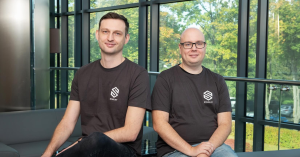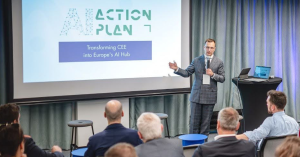Angelos Stavrakis is the founder and CEO of SafeSize, a fast-growing retail tech company offering an innovative AI-powered virtual fitting omnichannel solution that helps people find the perfect fitting shoes in physical and online stores.
Prior to SafeSize, Angelos founded two other companies and worked with large corporations in Management Consulting (The Boston Consulting Group), FMCG, and Retail. He holds a degree in Operations Research and Marketing (Athens University of Economics and Business) and an MBA (Bocconi and Kellogg School of Management).
Harnessing the power of AI and ML, SafeSize’s proprietary technology matches the consumers’ 3D foot scan and personal preferences with the largest database of 3D scanned shoes offering personalized shoe recommendations for adults and kids.
The company’s Innovation & Development Centre in Athens houses a team of 10 AI specialists, focusing on machine learning, deep learning, NLP, computer vision, and data science.
In this interview with The Recursive Angelos Stavrakis says he sees significant potential in the CEE AI innovation ecosystem, citing talent, government support, and cost-effectiveness but highlighting the need to bridge the gap between research and commercialization. He also highlights key factors that could bolster the AI product market, including increased R&D investment, collaborative ecosystems, supportive regulations, and global partnerships.
The following interview was conducted as a part of The Recursive’s “State of AI in CEE” report. Download the full report with insights from 40+ experts and an analysis of 900 AI product companies from CEE here.
The Recursive: Can you share what were the biggest milestones SafeSize has achieved in the past year and what are some of the biggest challenges that your company has faced during the development of your products?
Angelos Stavrakis: First and foremost, we secured €14M series B funding to fuel our international growth and product innovation, the biggest round so far.
We continued to grow our international operations and portfolio of leading clients, proudly operating in 53 countries around the world, spanning from Colombia and the UK to Norway, France, and Shanghai.
We opened our new office in Sydney, Australia to meet the growing demand for our innovative 3D foot scanning and shoe recommendation technology in the ANZ market.
We continued to invest in our people. We have built a diverse and highly talented team from 19 nationalities, 40% of which are women.
We successfully launched our new self-service, AI-powered Digital Sales Assistant, partnering with two major footwear retailers in Europe. This is a new product, designed and developed in our Innovation and Development Centre in Athens, Greece.
Additionally, we made significant advancements in refining our AI algorithms and data collection processes. We gathered an extensive dataset from various sources, including customer feedback and product evaluations, which has contributed to the accuracy and reliability of our shoe sizing recommendations. As a result, we have witnessed a substantial increase in customer satisfaction and a decrease in return rates for our partner retailers who have integrated our solution in their physical and online stores.
Of course, with innovation comes challenges. Ensuring that our technology caters to diverse foot shapes and sizes and that it aligns with the different brands and shoe models always poses a considerable challenge. For this reason, perfecting our AI models and optimizing our shoe recommendation algorithms is our key priority. In this process, it helps that we have the largest database of 3D scanned shoes in the world – data that we gather from scanning all types of shoes that are in the market in one of our 9 shoe scanning facilities in the US, Europe, and Asia.
What are currently your main markets to sell your products? And what are your company’s plans for product and business development in the next 12-24 months?
At present, our primary markets for selling our products are in the sports, fashion, and kids footwear industries, within Europe, China & Japan. Our AI-powered virtual fitting solution has gained traction among major footwear brands and retailers such as INTERSPORT, Decathlon, Sports Direct, HOKA, Puma, Adidas, due to its ability to increase sales, reduce returns, increase customer satisfaction, and enhance overall customer experience.
Over the next 12-24 months, our company plans to launch some new innovative retail tech products and diversify our offerings by expanding into new markets, such as the US. We aim to collaborate with footwear retailers and brands to help them revolutionize not only the way they sell shoes but also the way they produce shoes, harnessing the wealth of data we have.
Can you explain how your AI technology works and what kind of problems it helps you solve?
SafeSize’s AI technology is based on sophisticated machine learning algorithms that analyze vast amounts of foot and shoe data to determine accurate shoe size and model recommendations for customers. Our AI models process the 3D foot scan, the customers’ personal preferences information along with 3D shoe data, past purchases, fitting feedback, and shoe specifications to generate highly personalized shoe size and model advice.
The primary problem our AI technology addresses is the challenge all footwear customers are facing: ‘What is the right shoe size?’ both in-store and online. Traditional online shopping lacks the in-person experience of trying on footwear, leading to lower conversion rates and a higher risk of customers purchasing shoes that don’t fit properly. This results in increased return rates, customer dissatisfaction, and additional operational costs for retailers.
By providing highly accurate shoe size recommendations, our AI technology bridges the gap between physical and online retail. It instills confidence in customers that they are purchasing shoes that will fit comfortably, leading to a reduction in returns and an overall improvement in customer satisfaction. Moreover, as our technology becomes more widespread, it encourages consumers to embrace online shopping without the fear of ill-fitting shoes, further boosting the growth of the e-commerce market, while protecting the environment from the CO2 emissions caused by all the unnecessary transfers of shoes.
Your Innovation & Development Centre is based in Athens, Greece. How many of your employees work specifically in the AI field? What is the primary skill set of your employees in the AI field?
We have 5 offices in the Netherlands, Slovenia, Greece, China and Australia. In Athens, Greece our Innovation & Development Centre is based and this is where we design, test, and develop all our new products and technologies. We have a highly talented and diverse team of PHD-level engineers and retail experts working together to create the most advanced omnichannel virtual fitting solution in the footwear market.
We currently have a dedicated team of 10 employees working in the AI recommendation field. The primary skill set of our AI employees includes expertise in machine learning, deep learning, natural language processing (NLP), computer vision, and data science.
Which are the top AI specializations and skills in Greece according to you?
The top AI specializations and skills in Greece currently include natural language processing, computer vision, and general machine learning techniques. These areas are commonly applied in various industries, including retail, healthcare, finance, and manufacturing.
What is the current regulatory landscape like for companies that develop and sell AI-powered software or hardware products?
As of now, the regulatory landscape for AI-powered products varies across different regions and countries. There are no specific global regulations that comprehensively govern AI technologies, leading to a patchwork of different rules and guidelines. In some jurisdictions, AI regulations may focus on data protection and privacy concerns, while in others, they may address issues like bias and transparency in AI algorithms. For companies developing and selling AI-powered software or hardware products, compliance with existing regulations, such as data protection laws, consumer protection regulations, and intellectual property rights, remains essential. Additionally, adherence to ethical principles and industry best practices is crucial to ensure responsible and safe AI deployment.
How do you think the upcoming EU AI regulatory framework will impact the adoption of AI products and services? Are there any specific implications for your industry?
The upcoming EU AI regulatory framework, which is expected to introduce a comprehensive set of regulations for AI technologies, will likely have a significant impact on the adoption of AI products and services in Europe. The framework aims to address various AI-related challenges, including data privacy, transparency, and accountability.
For companies like SafeSize, which operates in the AI-powered retail industry, the regulations may have implications related to data usage, privacy, and the transparency of AI algorithms. Compliance with the new regulations will be crucial to gaining trust of customers, retailers, and regulatory authorities. However, the framework can also foster a more predictable and stable environment for AI innovation by setting clear rules and guidelines for developers and users alike.
How would you evaluate the potential for growth and development in the AI innovation ecosystem in CEE and why?
The AI innovation ecosystem in Central and Eastern Europe (CEE) has significant potential for growth and development. The region boasts a strong talent pool, with many skilled AI researchers, data scientists, and engineers. Additionally, the lower cost of operations compared to Western Europe presents an attractive environment for AI startups and companies looking to innovate.
Furthermore, governments and institutions in the CEE region are increasingly recognizing the importance of AI in driving economic growth and are providing support through funding, incentives, and policies aimed at fostering innovation in the AI sector.
However, the biggest challenge in the CEE region lies in bridging the gap between research and commercialization. While the region has excellent talent, transforming research-driven projects into scalable, market-ready products can be challenging.
Which factors will have the biggest impact on improving the outlook for the AI-powered software or hardware product market in the CEE region in your view?
Several factors can significantly improve the outlook for the AI-powered software or hardware product market in the CEE region.
- Firstly, increased investment in AI research and development, along with funding opportunities for startups and scale-ups, will foster innovation and attract talent to the region.
- Secondly, collaboration between universities, research institutions, and private companies can create a robust ecosystem that facilitates the transfer of knowledge and technology from academia to industry. This will help bridge the gap between research and commercialization.
- Moreover, promoting a supportive regulatory environment that encourages responsible AI innovation and data-sharing while protecting consumer rights and privacy will create a more predictable and stable market for AI companies.
- Finally, partnerships with international companies and participation in global AI initiatives can open up access to larger markets and opportunities for CEE-based AI companies to expand their reach and impact.








